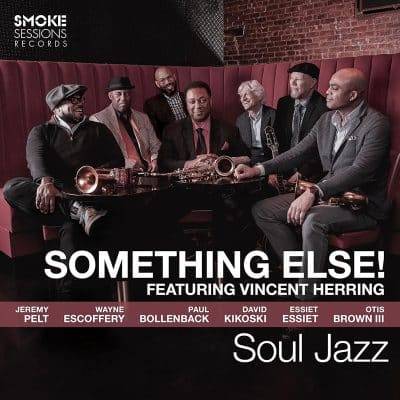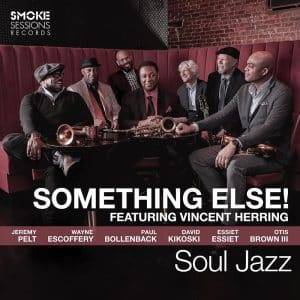Something Else! Soul Jazz Featuring Vincent Herring
 Something Else!
Something Else!
Soul Jazz Featuring Vincent Herring
Smoke Sessions
Having witnessed a live performance by the collective Something Else! a little over a year ago at Exit Zero Jazz Festival, this album comes with anticipation. That’s because the soul jazz genre is not often heard much these days. It’s like traditional blues; we grew up with both and both are getting more difficult to find these days. Altoist Vincent Herring leads his group of like-minded musicians in this mission of resurrection as they honor compositions of Horace Silver, Stanley Turrentine, Eddie Harris, Pee Wee Ellis, Herbie Hancock, Donald Byrd, and, of more recent vintage, Roy Hargrove. Rather curiously they also include John Coltrane’s “Naima” which came out in the fertile jazz period of the late ‘50s and early ‘60s, the Soul Jazz era, but has never been labeled as a soul-jazz tune. They render it in such a way that it fits well within the repertoire.
Now to shed more light on the term collective, only Herring, guitarist Paul Bollenback, and pianist David Kikoski were members of the band that performed under the Something Else! Banner at Exit Zero, the others being Randy Brecker, James Carter, Johnathan Blake, and Yasushi Nakamura. Here on the Smoke Sessions debut of the group are respectively trumpeter Jeremy Pelt, tenorist Wayne Escoffery, drummer Otis Brown III, and bassist Essiet Essiet. Both the live and studio performers were hand picked by Herring because this music is at the core of what they play, even though most of them, certainly Brecker, Pelt, and Blake, are amazingly wide ranging.
The band name, as most likely realize, is from the classic 1958 Cannonball Adderly classic, his first as a leader when stepping away from Miles Davis’s lauded sextet that issued the landmark Kind of Blue. The Adderleys are considered among the architects of soul jazz and Herris toured and recorded for nearly a decade with Nat Adderley following Cannonball’s death and subsequently formed the Cannonball Adderly Legacy Band with drummer Louis Hayes. So, this territory is more than familiar for Herring. Notably, although there were Adderley tunes in the live performance mentioned at the top, the album does not include any Adderley tunes. Maybe that would have been too ‘pat.’ Listen carefully though and you’ll hear a subtle quote of Nat’s immortal “Work Song” in the drum solo on Turrentine’s “Too Blue.”
The band launches full bore locomotive style in the opener, Horace Silver’s hard bop “Filthy McNasty,’ running at a full gallop behind the bass-drum tandem with heated, albeit brief solos from Herring, Pelt, Escoffery, Kikoski, and Brown. That breakneck tempo recedes nicely into the gritty, soulful groove of Turrentine’s “Too Blue,” with Kikoski setting the tone in his intro. The ensemble plays the theme briefly, surrendering to Bollenback’s deep, bluesy lines that lead to extended turns from Herring and Escoffery. If this doesn’t have lifelong jazz listeners reaching for classic soul jazz albums of the era, nothing else on this session will either. This is the essence of the idiom.
Herring grew up with Eddie Harris’s music playing in his home and while the inclusion of “Mean Greens” might be a rather obscure choice compared to the others, it is certainly in the leader’s wheelhouse, abetted by Kikoski’s judicious jabs and front-line interplay. Ellis’s “The Chicken” may remind listeners most of the Adderley sound here with Brown’s uncanny backbeat and Essiet’s in-the-pocket bassline steering the septet which delivers gritty statements from each soloist. The ensemble faithfully renders Hancock’s “Driftin’” from the pianist’s 1962 debut Takin’ Off, proving to be a feature for Escoffery, in one of the album’s most outstanding moments, quoting Dexter Gordon who played on Hancock’s original as well as his other idols, Sonny Rollins and Jackie McLean.
Byrd’s “Slow Drag” takes it down into sultry, noir territory with a moaning, emotive solo from Pelt standing out. Each of these tunes follows the convention of head-solo-solo-solo-head and Herring works democratically to allow room for statements from all the melody players in each composition. The late trumpeter Roy Hargrove obviously is not from the classic era of soul jazz, but his music was often a revitalization of the form as heard here on the hand clapped “Strasbourg/St. Denis” which has that infectious soulful strut common to so many of the vintage soul jazz tunes. Coltrane’s “Naima” is simply one of the top ballads in the jazz canon, covered countless times. Herring and crew elevate the tempo here and the leader’s tone is just superbly clear as he takes the first turn. Brown shifts the modulations on his kit, keeping it interesting and sounding, yes, remarkably like a soul jazz tune. Bravo to all!
- Jim Hynes
BUY NOW
Buy Us a Cup of Coffee!
Join the movement in supporting Making a Scene, the premier independent resource for both emerging musicians and the dedicated fans who champion them.
We showcase this vibrant community that celebrates the raw talent and creative spirit driving the music industry forward. From insightful articles and in-depth interviews to exclusive content and insider tips, Making a Scene empowers artists to thrive and fans to discover their next favorite sound.
Together, let’s amplify the voices of independent musicians and forge unforgettable connections through the power of music
Make a one-time donation
Make a monthly donation
Make a yearly donation
Buy us a cup of Coffee!
Or enter a custom amount
Your contribution is appreciated.
Your contribution is appreciated.
Your contribution is appreciated.
DonateDonate monthlyDonate yearlyYou can donate directly through Paypal!
Subscribe to Our Newsletter
Discover more from Making A Scene!
Subscribe to get the latest posts sent to your email.














































